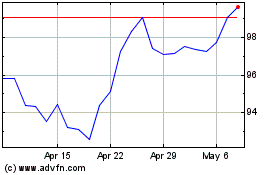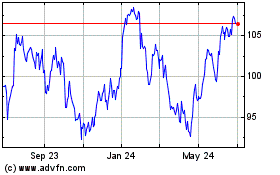Novartis Weighs Alcon Spinoff -- WSJ
January 26 2017 - 3:02AM
Dow Jones News
Eye-care business, which Novartis paid $51.6 billion to control,
is still struggling
By Denise Roland
Novartis AG is considering spinning off its ailing eye-care
business Alcon, one year into a slower-than-expected turnaround for
that business.
The Swiss pharmaceutical giant said it would explore all options
for the Alcon business, which sells eye-care technology such as
contact lenses, lens implants and associated surgical tools.
The potential spinoff comes seven years after Novartis gained
full ownership of Alcon, a move that it had hoped would allow it to
capitalize on the fast-growing eye-care market. In total, it paid
$51.6 billion for the business.
Chief Executive Joe Jimenez said he wouldn't rule anything out,
but suggested that a spinoff could "create a big opportunity for
our shareholders" due to the scarcity of listed eye-care device
companies of its size. He said the company would announce its
decision near the end of the year.
The decision comes as the company struggles to revive growth at
Alcon. A year ago, Mr. Jimenez had hoped that fresh leadership and
a new focus on devices like lenses, lens implants and surgical
tools -- he moved Alcon's ophthalmology drugs into Novartis's
broader pharmaceuticals division -- would return Alcon to growth in
the second half of 2016.
Instead, Alcon is still struggling, with sales flat in the
fourth quarter, though Mr. Jimenez said there were signs of
improvement, noting that contact-lens sales had grown for the third
consecutive quarter.
Novartis on Wednesday said earnings and revenue for the whole
company fell in the fourth quarter, largely due to the strength of
the dollar. It also announced a share buyback worth up to $5
billion.
Net profit fell 11% to $936 million in the three months to Dec.
31, compared with $1.05 billion in the same period a year earlier,
while revenue declined 2% to $12.32 billion.
Adjusting for the strength of the dollar, revenue and net income
were flat, as falling sales from old cancer medicine Gleevec offset
growth of some of Novartis's newer drugs.
Novartis is leaning heavily on two newer drugs -- Entresto for
heart disease and Cosentyx for psoriasis and some rheumatoid
diseases -- to offset a sharp decline in sales from Gleevec, which
last year started to face competition from cheaper
alternatives.
While Cosentyx has ramped up quickly since its launch in 2015,
notching sales of $1.1 billion last year, Entresto has so far
proven a disappointment. Also launched in 2015, it generated sales
of just $170 million last year, missing even Novartis's own modest
goal of $200 million.
Still, Mr. Jimenez said he expected momentum to increase this
year, thanks to the company's heavy investment in an expanded sales
force, more favorable coverage from health insurers and the recent
endorsement of major cardiology groups in the U.S. and Europe.
"Everything we're seeing on Entresto is giving us confidence for
the future," he said, adding that the company expects prescriptions
to triple over the course of 2017.
Novartis said it expected 2017 sales to be broadly in line with
last year at constant currencies.
Write to Denise Roland at Denise.Roland@wsj.com
(END) Dow Jones Newswires
January 26, 2017 02:47 ET (07:47 GMT)
Copyright (c) 2017 Dow Jones & Company, Inc.
Novartis (NYSE:NVS)
Historical Stock Chart
From Mar 2024 to Apr 2024

Novartis (NYSE:NVS)
Historical Stock Chart
From Apr 2023 to Apr 2024
